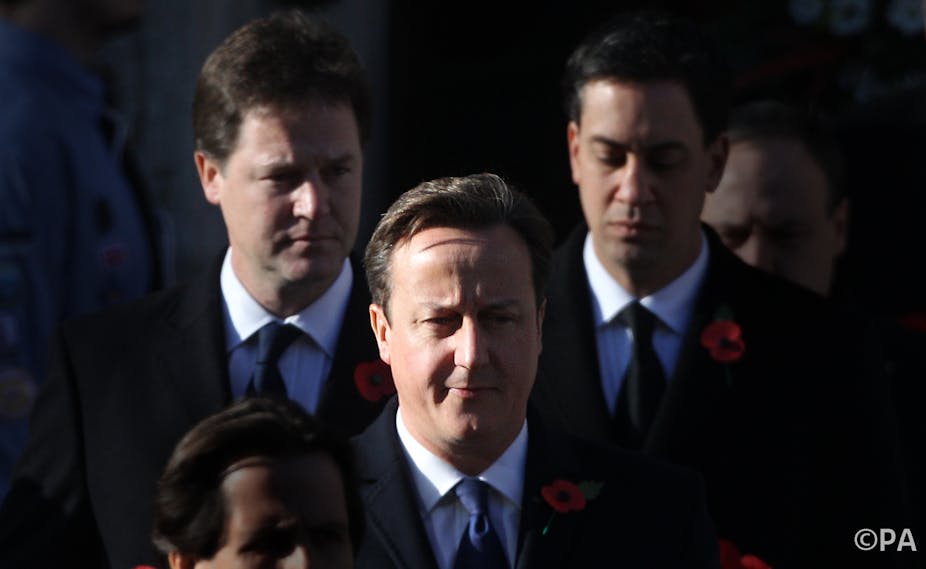The future of the NHS will clearly be a key issue for the 2015 General Election. Any institution that costs the country so much, and touches so many people’s lives, cannot avoid being a topic for political debate.
However, this institution is peculiarly ill-suited to the short-term nature of much British politics. Successive governments have focused on being seen to do something, and on generating favourable media coverage across the electoral cycle. This has resulted in a series of reorganisations and patches since the 1980s.
In the policy community, the consequences are widely regarded as chaotic, demoralising and wasteful. Unfortunately, unless the election has a clear-cut result, this seems likely to continue as coalition partners bargain for baubles or a minority government offers pork-barrel deals to win support from minor parties on specific votes.
No primary goal

Fundamentally, the problem for the NHS lies in the inability of politicians to settle on its primary goal and on how we should achieve it. Should we have a national health service, focused on preventing people getting ill and minimising their dependency on healthcare? Or should we have a national sickness service, focused on repairing the damage done by everyday life in the modern world?
If we could agree on the primary goal, we then have to balance four concerns about the means for achieving it. We want these to be efficient – not wasting taxpayer’s money; effective – doing what it says on the tin; equitable – equally accessible to all citizens; and humane – nicely giving people what they want.
Unfortunately, any one of these choices can also provoke negative political consequences. If we emphasise the promotion of health, we very quickly come to the detailed regulation of everyday lives and major industries, the “nanny state” that deprives consumers of choices and damages the interests of successful companies.
If we emphasise the repair of damage, we discover that this is a really costly thing to be doing – and those costs are not paid by the people who did the damage. When we come to the means, we find that efficiency, effectiveness and equity are often at odd with humanity.
Human life does come with a price

Our emotions are plucked by calls for the NHS to pay for hugely expensive or unproven treatments, often in the US, to save individual lives, especially those of children. These are good stories – but we do not hear about the greater number of anonymous lives that could be saved or improved by allocating those resources in less showy directions.
People sometimes say that you cannot put a price on human life, but this is always essential. Healthcare competes with other desirable services in any society – education, public order, defence, even leisure and private consumption. No-one can write a blank cheque for the sick.
Governments have tried, and failed, to distance themselves from these debates. Although governments have created structures that appear to make the NHS more independent, political accountability seems inescapable.

Aneurin Bevan, the minister who established the NHS, was quite open about this when he declared that a bedpan dropped in a hospital in Tredegar, his constituency, should be heard in his office in Whitehall (when bedpans were made of stainless steel rather than compressed paper).
The present government has created a formal structure of delegation, but, in practice, health ministers have been unable to escape questions in parliament about precisely what is happening to local services.
Insurance-based systems do not necessarily perform better, because so many resources are used up in checking eligibility, billing, chasing debts and general administration. They also tend to focus on repair, which is measurable, rather than on prevention. If insurers have to decide which patients get what treatment, healthcare providers cannot escape the hard choices about efficiency and effectiveness: insurers have to think about whether customers can afford their premiums as well as about the amount they spend on the beneficiaries.
Nevertheless, politicians still get involved. The US has a patchwork of state laws that force insurers to provide treatments for articulate patient groups that they would not provide on any rational analysis.
The UK gets remarkable value for money from the NHS, and there is a good argument that funding should be raised closer to the level of some of our European neighbours to meet the needs of an ageing population. However, the NHS also deserves politicians with a more strategic vision, who are ready to make, and defend, hard choices rather than blowing with every sad headline or imposing a new re-disorganisation as the fancy takes them.

